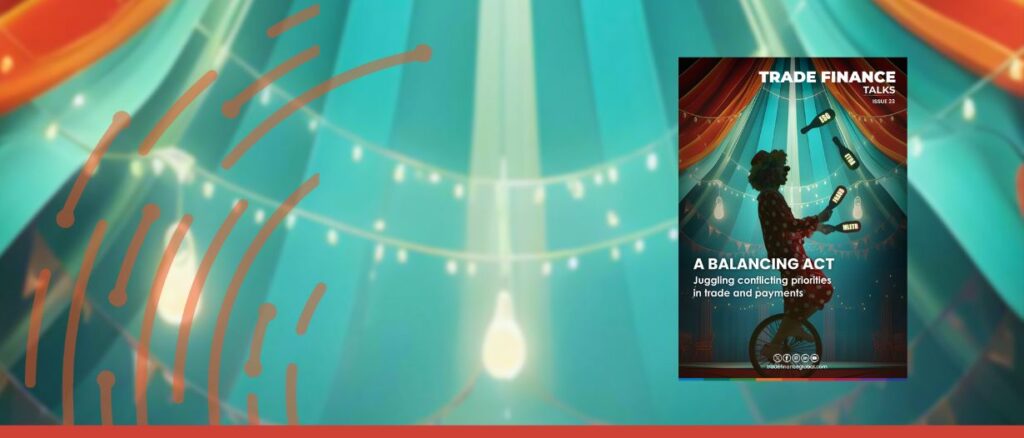Estimated reading time: 4 minutes
Beijing, China. Welcome to the latest edition of Trade Finance Talks. It is entitled “A Balancing Act: Reconciling Conflicting Priorities in Trade and Payments.”
The continued growth and influence from Asia in trade cannot be ignored. Asia’s trade growth continues to soar, with the Asian Development Bank (ADB) forecasting 5% growth in 2024 due to strong domestic demand and a recovery in exports. Regional integration and modern trade agreements are strengthening the resilience of key sectors such as food and technology. Asia is also benefiting from increased demand for AI-driven technology exports, particularly semiconductors. However, risks such as geopolitical tensions and protectionism remain.
Issue 23 brings together seemingly disparate topics that we believe are unified by a fundamental question that everyone always asks: What should we prioritize? Unfortunately, trade is a playground for bad guys. From trade-based money laundering and fraud to financing Russian and Iranian-backed arms deals, bad actors are exploiting global supply chains. And as technology evolves, so too do the ways we leverage this technology.
However, for banks and businesses, decisions are not binary. Businesses must balance digital transformation, green investment, and compliance with regulatory frameworks while remaining competitive and profitable. It’s not just complicated. It’s like juggling uphill or tightrope on a unicycle. This delicate balancing act is perfectly aligned with Sibos’ theme of ‘Connecting the Future of Finance’.
But as our cover art alludes to, the world of trade, finance, and payments is expected to look less like Pennywise and more like Bozo the Clown. So instead of a Halloween costume to scare next week’s trick-or-treaters, it’s a fun circus clown meant to make people laugh.
For Sibos, in order to follow popular demand and our historical choices, a section of the magazine dedicated to digital developments was inevitable. We have an international perspective, but also a focus on Africa. A holistic view of the industry and scrutiny of small and medium-sized enterprises. and considers individual responsibility, partnerships, and the role of government.
A long-standing source of frustration for many in the industry has been cumbersome documentation that requires wet-ink signatures. Why do bills of lading and bills of exchange remain paper-based when every other industry is adopting technology so rapidly? Magazines should serve as a guide, often supplementing online content.
Looking ahead, environmental, social and governance (ESG) issues cannot be ignored. During Sibos, there will no doubt be discussion about the unfortunate fact that returns on ESG investments are substandard. In our Green Finance section, we looked at a range of sectors to understand exactly what’s working, what’s not, and where to go next. The opportunity to speak with industry leaders revealed just how strong these environmental commitments are and painted an optimistic picture for the years ahead.
And finally, let’s talk about regulations. From the Prudential Regulation Authority’s (PRA) Basel 3.1 or Basel IV to compulsory recourse for victims of Authorized Push Payments (APP) fraud registered by the Payment Systems Regulator (PSR) and the Bank of England, regulation here in the UK , became Labyrinthian. Overseas, the Hin Leong trade debacle has upended trade finance laws in Singapore, and Georgia is reshaping its financial landscape with regulatory changes to support alternative financing for small and medium-sized businesses.
The response has been passive, almost defiant, but it is clear that tighter regulation creates space for productivity and innovation. It is said that the most important part of an F1 car is the brakes. Knowing there is a failsafe gives drivers the courage to go faster and take more risks. The same goes for regulations. Ostensibly it exists only to slow down banks, but in reality it enables sustainable and accelerated development.
Fortunately, many of these goals work together. As our esteemed writers elaborate, digital solutions bring environmental solutions. Regulatory compliance prevents technology from being misused for illegal activities. Sustainable initiatives can be implemented through government mandates. You can use any number of connections, such as And the more connections there are, the tighter the network and the stronger the industry.
When the world of trade, finance and payments moves too fast, this magazine exists to provide an axis, or gravitational pull, of industry-leading analysis provided by our network of experts.

